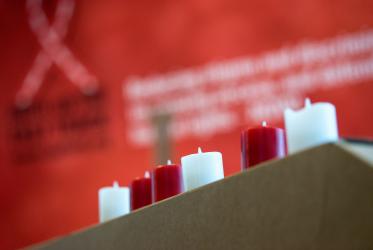The World Council of Churches Ecumenical Advocacy Alliance (WCC-EAA) is taking registrations and workshop proposals for “Faith on the Fast Track,” an interfaith pre-conference scheduled for 16-17 July in Durban, South Africa.
The WCC event will precede the 21st International AIDS Conference in Durban, which runs from 18-22 July.
UNAIDS, the Joint United Nations Programme on HIV/AIDS, has formulated a Fast Track strategy to ensure that AIDS is eliminated as a public health threat by 2030. The strategy includes specific targets for achievement by 2020, including: 90% of people living with HIV will know their status; 90% of those will be on treatment; 90% of those will have suppressed viral load.
Supporting this strategy, WCC-EAA’s Faith on the Fast Track will focus on:
— reducing stigma and discrimination, including stigma within local faith communities, and stigma toward marginalized and key populations;
— increasing access, including community-based HIV services, and services for infants, children, and adolescents;
— defending human rights, including dealing with discriminatory laws and policies.
The registration deadline is 8 July. The cost is Euro 100 for international participants, or Euro 30 for participants from Southern African Development Community countries. To register, visit www.iacfaith.org.
Faith-based activities vital for Fast Track success
It is critical that the faith community support and advance the Fast Track strategy, said Francesca Merico, HIV campaign coordinator for the WCC-EAA. “We must act now if we want to save millions of lives, avoid the needless deaths of 21 million people, and prevent 28 million new infections.”
As Dr David Barstow, founder of EMPACT Africa and a member of the Global Organizing Committee planning the pre-conference states, while the Fast Track targets for 2020 are formulated in medical terms, “the reality is that much of the work that must be done involves the non-medical, social aspects of the AIDS epidemic: the barriers presented by stigma and discrimination, the importance of human rights in addressing the epidemic, the need to focus on key populations at increased risk of infection.”
The link between social justice and AIDS prevention has never been more evident, Merico added. “Science alone is not enough. More than ever, AIDS is the result of social inequity and injustice,” she said.
During the 21st International AIDS Conference, the WCC-EAA will coordinate and provide space for faith-based participation as it has done for the last five conferences, including the leadership of the WCC Ecumenical HIV and AIDS Initiatives and Advocacy and partner organizations such as World Young Women's Christian Association, and the Lutheran World Federation.








